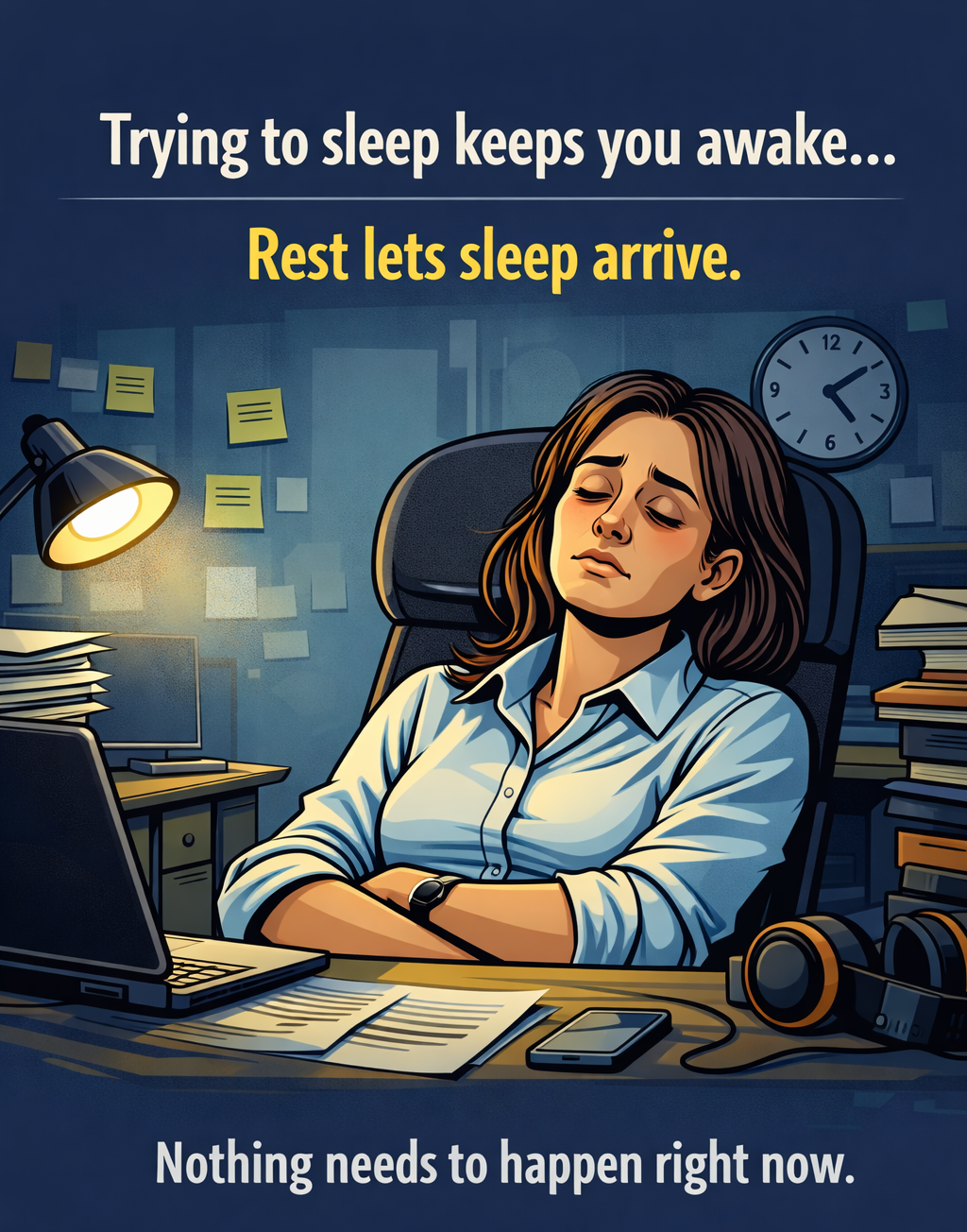
Rest & Recovery
Life skills for when your brain won't shut off. Get the 30-minute reset now.
Capacity Intelligence™ - tools that match your actual nervous system state, not another sleep routine to fail at
It's 2 a.m. and you're staring at the ceiling again. Rest and recovery skills aren't about sleep optimization - they're about the fact that your body is still running yesterday's stress while your brain rehearses tomorrow's problems. Eyes that burn. That wired-tired thing where you're exhausted but your nervous system didn't get the memo.
44% of professionals report daily workplace stress. Honestly, at 2 a.m., that number feels low.
You've probably tried the sleep hygiene stuff. The apps. They assume you're starting from a regulated nervous system. That quiet gap between "I know what I should do" and actually being able to do it when you're running on fumes. We get it. Probably writing this in Yellow Zone ourselves.
Here's What's Actually Happening

Your nervous system is stuck in a stress response that doesn't complete. You carry the day's tension into the night, and the night's broken rest into the next day. It's not a habit problem. It's not discipline. Your brain's arousal centers keep running when they should be offline - that's neuroscience, not a character flaw.
Most rest advice assumes Green Zone - full capacity, executive function online. But you're searching at 2 a.m. because you're not there. Standard sleep tools are Green Zone tools aimed at someone already regulated. No wonder they feel like another task to fail at.
Capacity Intelligence™: Notice your zone, pick the version of the tool that fits it - instead of forcing full-effort rest strategies when you're clearly running on nothing. Learn more about the Capacity Intelligence™.
What's In It For You
This isn't about fixing sleep. It's about lowering the demand on a system that's been asked to do too much.
Relief looks like this: catching the overthinking spiral before it takes the whole night hostage. Having one thing to do at 3 a.m. that actually helps. Mornings where you're not starting in a deficit. Brain health has an ROI - up to 12% GDP impact globally - but honestly you'd settle for not feeling like you got hit by a truck. See the full breakdown of your Capacity Intelligence™ ROI.
One zone-aware reset can shift the next few hours from spiral to actual rest. Not sleep necessarily. Just less war with yourself.
What You'll Learn
- Why your brain won't shut off - nervous system patterns, not personal failure
- The 3 a.m. protocol - 90 seconds, works about 70% of the time when you remember it
- Zone-scaled rest tools - Full, Smaller, Tiny, and Can't-Even versions
- Scripts for the racing mind - what to think when your brain generates 2 a.m. problems
- 24/7 AI Coach - matches tools to your current zone
Built for ADHD brains, works for everyone. Not therapy - practical skills for the exhausted. Explore our neurodivergent-first design approach.
Real Talk About Results
First Session
One tool that might help tonight. Lower expectations.
Week 1-2
Starting to notice your zone before bed. Maybe catching the spiral once.
Month 1
Less dread about bedtime. Not perfect - just less war.
Month 3
Zone awareness becomes automatic.
60% feel something shift first session. 40% need a few tries. Some weeks you'll nail it, others you'll forget the tools exist and stare at the ceiling anyway. Currently on my third attempt and forgot twice this week. Still better than pretending melatonin was going to fix a dysregulated nervous system.
Start Your 30-Minute Reset
Give this 30 minutes. See if your nervous system shifts - even less tension in your shoulders is a win you'll feel in your body, not just your head.
Actually free, no credit card. I know that sounds suspicious.
Want to go deeper? Expand any section below.
Why Most Rest & Recovery Tools Fail
Standard rest advice has a hidden assumption: that you're starting from a regulated state. This is what we call the Green Zone Trap - most wellness tools assume you have the capacity to use them.
But if you're searching for help with overthinking before bed or nighttime anxiety, you're probably not in Green Zone. You're in Yellow at best, maybe Red. And Green Zone tools don't work in other zones. They just add another thing to feel bad about failing at.
What Actually Works by Zone
| Zone | What Works |
|---|---|
| 🟢Green | Full tools. Build skills, practice techniques, experiment with what helps. This is when sleep hygiene actually makes sense. |
| 🟡Yellow | Simplified. 2-3 steps max. External prompts. Don't try to build habits - just get through tonight. |
| 🔴Red | Emergency only. 90 seconds or less. One breath. One physical anchor. Nothing that requires thinking. |
| ⚫Can't-Even🪫 | Survival. Permission to not fix anything. Just exist. Some nights, staying horizontal is the whole achievement. |
Capacity Intelligence™ means matching the tool to the zone you're actually in - not the zone you wish you were in. That's the difference between a tool that helps and another thing to fail at. Learn more about the Can't-Even Zone.
The Science (Plain Language)
Your nervous system has two main modes: sympathetic (activated, stressed, alert) and parasympathetic (calm, resting, recovering). Modern work keeps most of us stuck in sympathetic mode far longer than our biology expects.
The stress cycle needs to complete - your body needs to process the activation, not just endure it. But modern life interrupts this constantly. You get stressed in a meeting, you don't fight or flee, you sit there and absorb it. The stress stays in your body. Then you carry it home. Then you carry it to bed.
Key insight: The arousal centers in an insomniac's brain keep running when they should go offline. The prefrontal cortex - planning, worrying, problem-solving - stays active. That's why it feels like your brain won't shut off. It literally hasn't. This isn't weakness; it's neurobiology.
Polyvagal theory (short version): your vagus nerve affects whether you feel safe enough to rest. If your nervous system is reading threat - even low-level, background threat from work stress - it won't let you drop into deep rest. Makes sense evolutionarily. Terrible for sleep.
This is why you can't think your way out of activation. The body leads. Effective rest tools work bottom-up: calm the body first, then the mind follows. Not the other way around. That's why all those "just stop worrying" suggestions don't work - they're asking cognition to override physiology. See our research foundation for more.
How Rest Connects to Other Skills
Rest doesn't exist in isolation. It's tangled up with stress, focus, resilience - pulling on one affects the others. That's why we built this as a system, not isolated topics. Learn more about why integrated skills training works better.
Who This Is Really For
The Overwhelmed Professional
You're good at your job, but the job follows you home. Lying in bed replaying the day, pre-playing tomorrow, generating problems that might not even exist. You've tried the apps. You've tried the routines. Nothing sticks because nothing accounts for the fact that you're not starting from calm.
The Neurodivergent Professional
Your capacity swings are wider and less predictable. Some nights your brain shuts off fine; others it's like someone left all the lights on. Executive function is already a thing you manage around - adding complicated sleep protocols just adds one more system to fail at.
The Manager Absorbing Team Stress
You spend all day regulating other people. Their stress becomes your stress. By the time you're home, you've got nothing left - but your nervous system is still on high alert. You need recovery skills that account for emotional labor, not just task load.
L&D or HR Evaluator
You're looking for evidence-based rest and recovery training that doesn't assume everyone's starting from the same place. Standard wellness programs assume Green Zone - that's why utilization drops off. See our employer solutions.
Two Routes: Find Your Starting Point
Not everyone's brain works the same way. We've built two pathways through this content - pick the one that fits how you process information and manage capacity. Explore why brains are wired differently.
Neurodivergent Route
If you have ADHD, autism, or other neurodivergent traits, your rest difficulties often come from executive function demands, sensory overload, or the exhaustion of masking all day. Your capacity swings are wider and less predictable.
The ND route emphasizes external structure over willpower. Alarms and prompts instead of "just remember." Tools that are short enough to use when focus is shot. Variable capacity is normal, not failure.
Neurotypical Route
If your capacity is relatively stable day-to-day and executive function isn't the primary bottleneck, the neurotypical route fits better. Your rest issues are real - they're just coming from different sources: workload, relationships, or cumulative pressure.
This route uses similar tools but with different framing, slightly longer formats, and less emphasis on external scaffolding. You'll still learn zone awareness and capacity matching.
Not Sure Which Route? Start with ND if: you've been told you're "inconsistent," your capacity varies dramatically day-to-day, or standard wellness tools felt exhausting to implement. Start with Neurotypical if: your challenge is more about volume than variability. You can switch anytime - this isn't a permanent assignment.
Research & Citations
44% Daily Workplace Stress
A record high. Gallup State of the Global Workplace 2024. This is baseline reality. Rest tools that ignore it are ignoring most people.
$1.1 Trillion Annual Cost
Mental health issues cost the global economy this much in lost productivity. WHO 2023. A significant portion is rest-related.
12% GDP Potential Increase
Improving brain health could raise global GDP by up to 12%. World Economic Forum 2024. Rest is brain health.
$3.7-$11.7 Trillion Value
Better workforce health adds this much in global value. McKinsey Health Institute 2025. Rest and recovery are foundational - not luxury, infrastructure.
4:1 ROI on Mental Health
Every $1 invested in mental health intervention returns $4 in productivity. WHO 2023. Single-session interventions can shift state meaningfully.
Clinical foundations: Our approach draws from CBT-I principles, Polyvagal Theory, and Acceptance and Commitment Therapy (ACT) - reframed for capacity-aware, zone-scaled delivery. Learn more about the research behind our approach.
You've Read the Depth. You Understand the Approach.
Now see if it works for you. 30 minutes, no commitment, no credit card.
One of 10 pillars included with your Emergent Skills subscription.
Your journey: Reset → Build → Thrive
Explore Related Skills
Rest connects to everything. When you're ready to expand, these pillars complement your recovery work.
Stress Mastery & Work-Life Balance
Address the stress that's keeping you awake. Complete the stress cycle before it follows you to bed.
Confidence & Calm Under Pressure
Reduce the anticipatory anxiety that fuels 3 a.m. problem rehearsals.
Emotional Mastery & Self-Forgiveness
Stop the self-criticism spiral that keeps your mind racing at night.